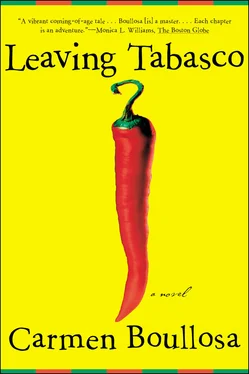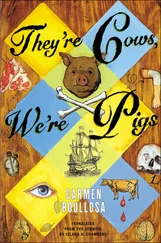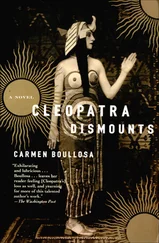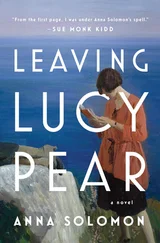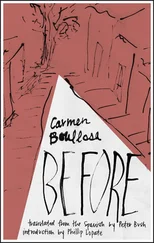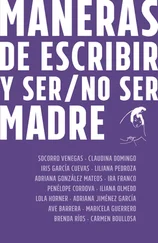We passed a town called Tamarindo, a wretched place that owed its existence solely to the presence of the highway, a clutter of stalls, probably assembled on the spur of the moment solely for the purpose of selling motorists food and refreshments. There wasn’t one tamarind tree to be seen on the town’s single street; only people eating crab legs and long slices of fried banana, and drinking fresh pineapple juice. We drove through Paseo de Varas and Chalchihuacan, more serious settlements, with their colonial church and central park where youngsters could stroll in search of love and somebody to start a family with.
Finally we reached the sea. The first things we found were seafood restaurants with rowdy musicians, located in thatched huts with a cement floor and metal tables without a tablecloth that some beer factory had lent them in return for advertising their products. My grandmother’s comment was “I for one have no intention of eating in those pigsties.”
“Don’t worry, Mama. I wasn’t going to take you there for a meal. I’ve got something else planned.”
The sand was fine and clean, the sea dark blue. As it was a holiday, there was a mob of people playing on the shore, kids, moms, grandmothers. There were lots of big fat mamas in nylon slips that the crashing waves had left transparent, revealing their gigantic flabby breasts, like secondary bodies viciously glued onto them, some with extraordinarily big bellies and thighs that had grown way out of control, at least according to my girlish criteria. These seal-like women looked gloriously happy, kids were howling with glee as they rolled around on the sand, mothers looked on smiling, fathers lying facedown on the sand let it infiltrate their underwear without moving a muscle. To be in the presence of the sea filled them all with exuberant joy, as if they were at the best of all possible parties. My grandmother observed them all with contempt from the thatched hut where we had been seated by two attentive boys. We were sipping fresh coconut milk.
“How they dare swim in those getups is beyond me,” said Grandma. “God made bathing suits for that sort of thing. Stupid people who just don’t know how to live!”
“But Mama, how can you say that? Bathing suits are really expensive.”
“Then they oughtn’t to go swimming.”
A little boy in his underpants picked up a used straw from the sand and improvising a blowpipe out of it scored a well-deserved hit on Grandma with a screwed-up paper bullet. He hadn’t heard what she’d said, but his intuition had told him she merited the aggression. Grandma didn’t feel the paper land on her hair, but I glared at the kid with blazing eyes, fearing the worst if Grandma were to realize. Almost bursting with giggles, the little boy darted away.
“I don’t know what’s the matter with you, always sticking up for those deadbeats, they don’t need your help, they can stand up well enough for themselves. They’re what’s wrong with this country, but you still—”
To avoid listening to them squabble, I got up from my chair, took off my dress, and ran in my bathing suit down to the sea. I left the deadbeats on the shore, rolling around with their sand-covered parents, and passing the women who looked like sea cows I swam off with the grace of a mermaid, while Grandma and Mama shouted for me to come back. For once I mattered. I kept on swimming till I reached the second beach, some three hundred yards out from them. I could still see them signaling with their arms for me to return. In view of all the energy they were putting into it, I realized I’d no option but to go back. The beach under my feet was covered in shells and starfish, though why we call them starfish when they’re basically round, I don’t know. I planned to return in a while to collect some. I didn’t know what could have gotten into those two to make them shout so much, but I dived back into the water and swam back the way I’d come. When I got there, I stepped out of the water, taking large strides to join them quickly because they were still calling out at me to hurry up, their faces all twisted, shouting themselves hoarse.
With water dripping off me, I realized that they weren’t the only two hysterics around; others were watching my arrival with concern. I turned my face to the horizon. Over the whole sea was stretched a second watery mantle, an enormous sheet of a lighter color, that in front of my eyes proceeded to gobble up the beach I had just visited.
“Silly girl!” Grandma was telling me. “How reckless can you get! You could have drowned. I mean, who’d get the crazy idea to swim so far off? It simply defies belief.”
If you couldn’t go in it, what was the sea for? I detached myself from the two nagging shrews. I heard people saying that it often happened, that this illusory beach would disappear as fast as it appeared, that you couldn’t trust it, because the sea’s second mantle would cloak the surface and drown anybody caught on the sandbar. The water had swallowed so many already; there was no counting the victims. I told as many as were willing to listen that I’d seen that beach covered in beautiful colored shells, with starfish and sea urchins.
A dark-complexioned girl of my age laughed at my words. “What’s the big deal there, blondie?” she said. “What do you think is under the sea? Shells that aren’t worth anything. You gonna sit down and make necklaces out of them like the Indians and sell them to gringos to hang around their necks?”
We had lunch at a restaurant with white tablecloths a little farther along. One of Mama’s cousins was expecting us, an idiot who kept saying he wanted to marry her. Mama kept him as a kind of informal boyfriend, perhaps, I think now, to divert suspicion from her affair with the priest. But what was the cousin trying to hide? I never found out, yet there was something in his look that sent shivers up my spine. But I knew the history of his brother, as did the whole town. He was a pilot, he had a beautiful wife he beat up from time to time, he had six children by her, my cousins, blond Gypsies forever traveling from pillar to post, from their grandmother’s house to their father’s house, because intermittently there’d be a bust-up and the mother would leave her husband, but she always went back to him. He had her tied to him by the chilling magic of his family.
On our way home the priest’s car crushed under its tires the crabs that were scurrying across the highway.
“This is the time crabs get massacred, daughter, on their way back down to the sea.”
We kept on crushing them to bits with our car. On the beaches near Agustini everything was devoted to devouring and killing.
18 My Uncle and the Bakery
The town’s bakery produced loaves of bread decorated in showy colors, doughnuts in strident Mexican pink, pancakes in royal blue, biscuits in lemon yellow. They even adorned their salty buns with a silly curlicue of colored sugar. For that reason, said Grandma, we never bought their individual items. She had them make large loaves for her without either coloring or sweetening, in place of those “disgusting monstrosities of the Indians.” From Monday to Saturday our bread was ready just before lunch, so we always ate it freshly baked. On Sundays Grandma made toast from the week’s leftovers, and anything else that remained, supposing that something did remain, went into a bread pudding with raisins and a glass of rum, along with almonds and slices of other nuts. It was an exquisite dessert.
Our household, like all the households of the better class of people, ate only white bread, but there were minor differences. The bread in the Juarez home was a little more voluminous than ours, and being a large family, they ate not one loaf a day but two. The loaves of the nuns were the same size as ours but had a cross set in the crust, made out of the same dough as the bread, and it was delivered in half dozens every other day. The Ruizes didn’t like big loaves. For them the bakery made round loaves that they called “country bread.” According to my grandmother, it was obvious they were still uncooked in the center and she claimed that it was eating raw dough that had given their youngest child, Ivan, his convulsions. The doctor had demolished her theory on numerous occasions, but she persisted in her belief and continued to preach it. She wouldn’t quit till she had convinced the whole town, the Ruizes included, that the round loaves were dangerous.
Читать дальше
